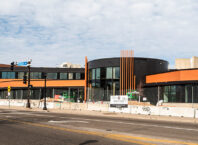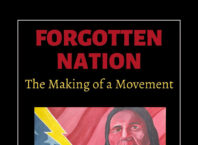Presidential election year thunder is generated by the race for the White House but that should not distract Native families and community leaders from paying close attention to school board elections and school tax referendums.
“Voting is the best way to make your voices heard at any level, and especially close to home,” said Louise Matson, executive director at Division of Indian Work (DIW), an operating arm of the Greater Minneapolis Council of Churches.
That is especially true this election year in Minneapolis, added Mary LaGarde, executive director of the Minneapolis American Indian Center.
The Nov. 8 ballot in Minneapolis has one at-large seat and three district seats – from western areas of the city – up for grabs on the nine-member Minneapolis Board of Education.
One race that is certain to attract attention among Native American residents pits Ira Jourdain, an enrolled member of the Red Lake Nation, against incumbent school board member Tracine Asberry in District 6 in the southwest area of the city.
Voters are also being asked to extend the existing property tax referendum that raises 13 percent of the Minneapolis Public Schools’ budget. This referendum would retain, not raise taxes from where they are now, and is equal to $1,604.31 per student.
In an Aug. 17 statement from the schools, education officials noted the existing referendum manages class sizes and provides supportive services for students. It funds 750 positions that include 591 classroom teachers, 82 academic and behavioral specialists, and 81 teachers and support staff for English language learners (ELL).
The election comes at a time of transition in Minneapolis schools. The newly-elected board will work with newly-hired superintendent Ed Graff who started with the current school year. Graff, a native of Bemidji, was formerly superintendent of schools at Anchorage, Alaska.
That change in leadership coincides with Minneapolis schools policy changes that are especially important to the Minneapolis Native American community. DIW’s Matson said the new school board is scheduled to approve or reject a revised Memorandum of Agreement (MOA) on Jan. 17 with the American Indian community.
Minneapolis became the first non-reservation public school system in the US to reach an agreement with Native groups on Indian education policies and programs with acceptance of the first MOA in 2006, which was updated in 2012.
Three committees are currently working on a 2017 revision, Matson said, that involve the Phillips Indian Educators Committee (PIE) and the Metropolitan Urban Indian Directors (MUID) among partnering organizations.
The Minneapolis Indian Education program that functions under the MOA serves about 2,000 Minneapolis school students from 30 different tribal nations out of a total school district enrollment of about 36,000.
American Indian students are enrolled in every district school with the largest enrollments in MOA-created schools that include the Anishinabe Academy and All Nations-South High School.
Statewide, research by the Minnesota State Senate shows 16,200 American Indian students attend public schools while another 2,000 attend tribal contract schools and 400 additional students attend alternative education programs.
This means the Minneapolis school system provides educations for Native American children whose enrollments are approximately equal to the combined Circle of Life (White Earth Reservation), Bug-O-Nay-G-Shig (Leech Lake Reservation), Fond du Lac Ojibwe (Fond du Lac Reservation) and Nay Ah Shing (Mille Lacs Reservation) schools.
The candidates
Most of the candidates for school board express lofty goals for empowering students to succeed in school and beyond. Minneapolis high school graduation rates improved within the past year but had been lingering around 50 percent for Native American and Black American students in recent years. Not surprising, then, U.S. Census Bureau data released Sept. 15 show racial disparities continue for median household incomes.
Black households had median incomes slip in 2015 to $30,300 from $31,021 in 2010, the Census Bureau found. American Indian household incomes improved to $36,900 last year, up from $33,665 in 2010. In contrast, all Minnesota households had median incomes increase to $63,500 from $62,099 in those five years.
Most of the board candidates cite disparities as a challenge for schools and public policy.
- At-Large: Kim Ellison is the current vice chair of the board now representing District 2 in the city, is seeking a full term on the board as an at-large member. She is currently a board liaison to the American Indian groups involved with the MOA programs. Ellison is opposed by Doug Mann, a critic of some school practices who is making his 10th run for a school post position since 1999. Mann has the Green Party endorsement; Ellison is endorsed by the DFL.
- District 2: Kimberly Caprini and Kerry Jo Felder are running for the seat being vacated by Ellison. Both are parents of Minneapolis students and both have been active with the schools. Caprini shows personal endorsements on her website; Felder has the backing of the DFL, Congressman Keith Ellison, and several labor unions.
- District 4: This district has one of the more unusual races. Incumbent Josh Reimnitz is not a native of Minneapolis and doesn’t have children there, but wants another term and for the board to focus on governance while the new superintendent focuses on management. Bob Walser comes from the music and arts fields, is a parent in the district and is married to a Minneapolis school teacher. Walser has the DFL endorsement.
- District 6: This contest has Ira Jourdain (Red Lake Ojibwe) making his second run for the board and challenging incumbent Tracine Asberry who is seeking her second term. Both are parents of Minneapolis public school students and both have long records of working with the schools. Jourdain has worked in human services and as an insurance underwriter and served on a committee that partly produced the district’s 2006 MOA with the Indian community. He has the DFL endorsement in that race. Asberry is a former teacher in Minneapolis schools and is executive director of St. Paul Youth Services.






